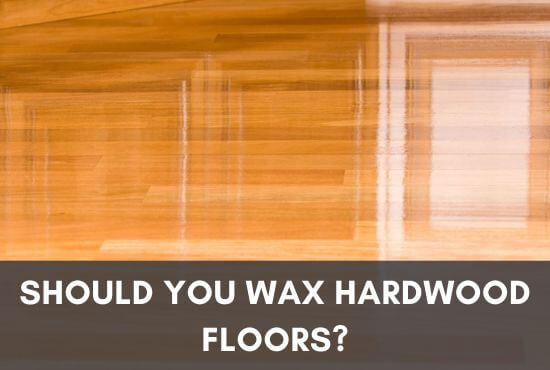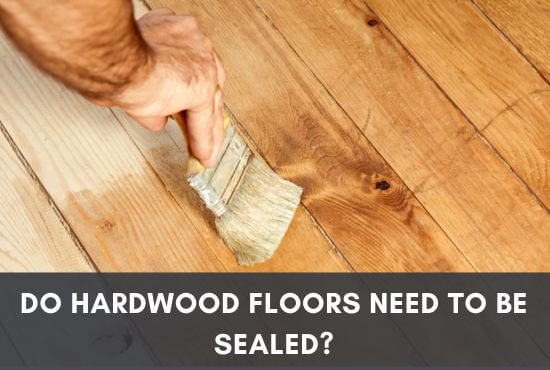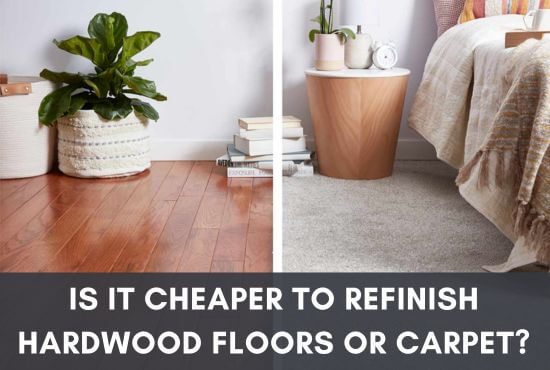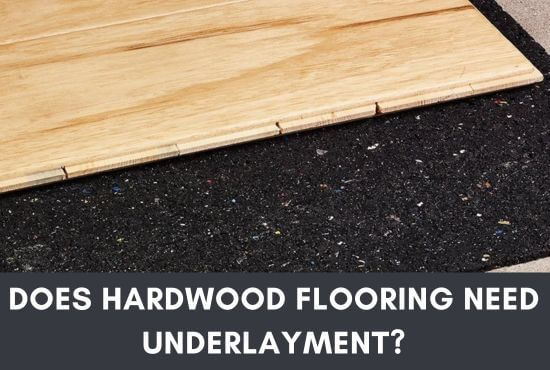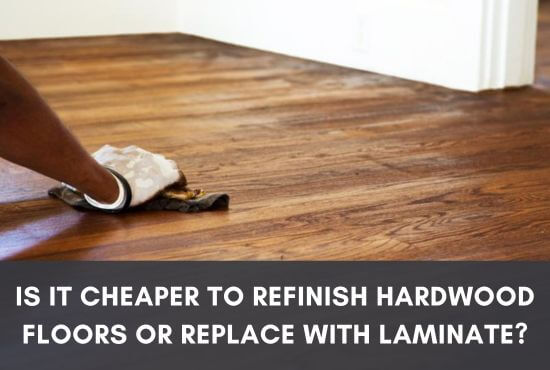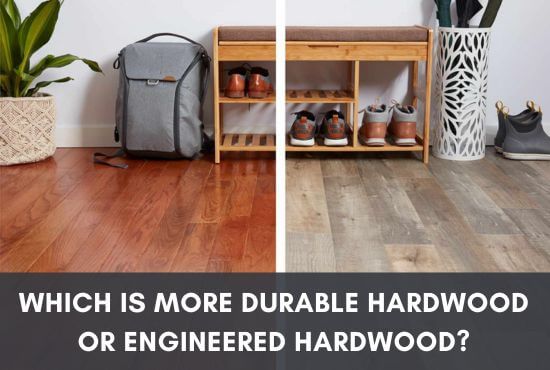The highlight of any house is Hardwood floors. They are stunning, sparkling, and full of personality and color. Even though they are beautiful, hardwood floors can be difficult to clean.
They need regular cleanings, ongoing care, and knowledge of which solutions are appropriate and which are not.
Chemicals/ substances such as vinegar, waxes, glass cleaner, etc. should not be used on hardwood floors as their excessive use may damage the floors. They can spoil the grain and texture of your hardwood floor’s surface and cause it to darken or lose color.
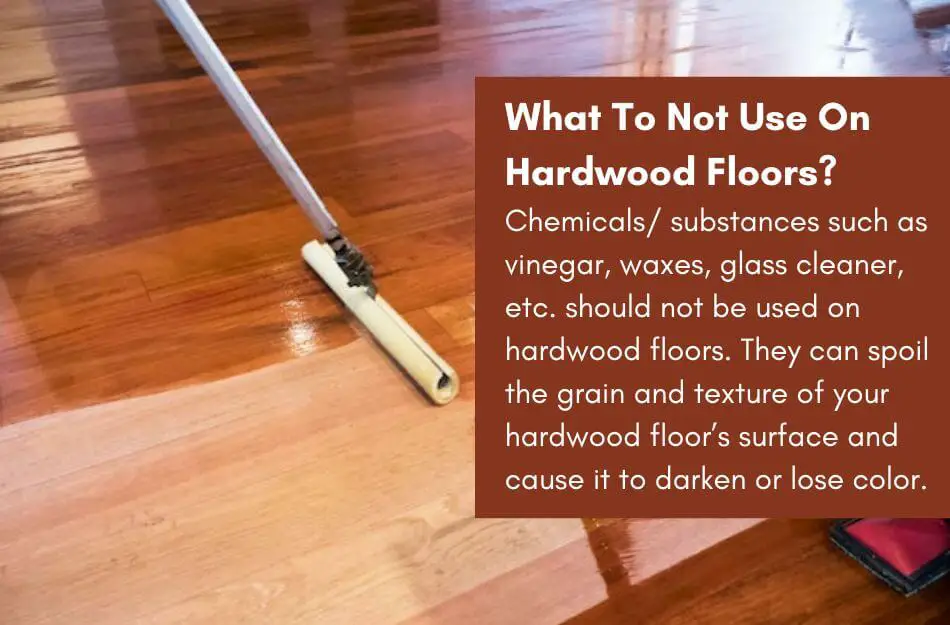
I am going to share 21 things that I found useful, yet a bit harmful on hardwood floors.
Table of Contents
- 1 What Not To Use On Hardwood Floors?
- 1.1 1. Vinegar and Ammonia
- 1.2 2. Oil Soap
- 1.3 3. Bleach
- 1.4 4. Liquid Polish
- 1.5 5. Lemon or Lemon Juice
- 1.6 6. Excess Water
- 1.7 7. Mop & Glo
- 1.8 8. Orange Glo
- 1.9 9. Pledge
- 1.10 10. Pine Solution
- 1.11 11. Dish Soap
- 1.12 12. Cleaning supplies
- 1.13 13. Oil
- 1.14 14. Glass Cleaner
- 1.15 15. Bona Polish
- 1.16 16. Hydrogen Peroxide
- 1.17 17. Sandpaper
- 1.18 18. Swiffer
- 1.19 19. Improper Cleaner
- 1.20 20. Polishes and Wood Renewal-Type product
- 1.21 21. Steam Cleaner on the Hardwood Floor
- 2 Are Wet Mopping Hardwood Floors Okay?
- 3 Does Hardwood Floor Swell if you Mop them with Water?
- 4 Final Thoughts
What Not To Use On Hardwood Floors?
Avoid using the following things when considering a cleaning procedure for your hardwood floors:
1. Vinegar and Ammonia
Cleaning solutions with bases of ammonia or vinegar chip away at the finish of your floor, and the grime is already there.
Your hardwood will eventually deteriorate due to the acid, producing splotchy places that are challenging to repair. It would help if you tried to get a pH-neutral cleanser.
2. Oil Soap
Although cleaners that contain oil are excellent at helping your floor look shining, they frequently only trap dust and grime on top of the varnishes, causing your floor to fade over time.
This residue might collect soil again, dull over time, and perhaps result in irreparable harm.
3. Bleach
Avoid using bleach to get rid of tough stains on your wooden floors. The surface may become permanently stained.
Therefore, it is wise to avoid using such cleaning products. You can use natural cleaning solutions or a specialized hardwood floor cleaning agent to prevent stains from damaging your sensitive and expensive flooring.
4. Liquid Polish
In Melbourne, you can purchase a selection of liquid polishing treatments that guarantee to keep wood floors looking and feeling good.
However, if you use them frequently, they are filled with oils and chemicals that will create sticky deposits on your surface. Moreover, it can discolor and impair the appearance of your floors.
5. Lemon or Lemon Juice
Lemon juice also has acidic qualities, which might damage the polish of your flooring. Avoid using lemon or lime juice on your wood floors if you want to keep their pristine appearance for years.
Your floors will get dull after using lemon, and the polish will deteriorate. Thus, using moderate, non-acidic cleaning products designed specifically for wooden floors is preferable.
6. Excess Water
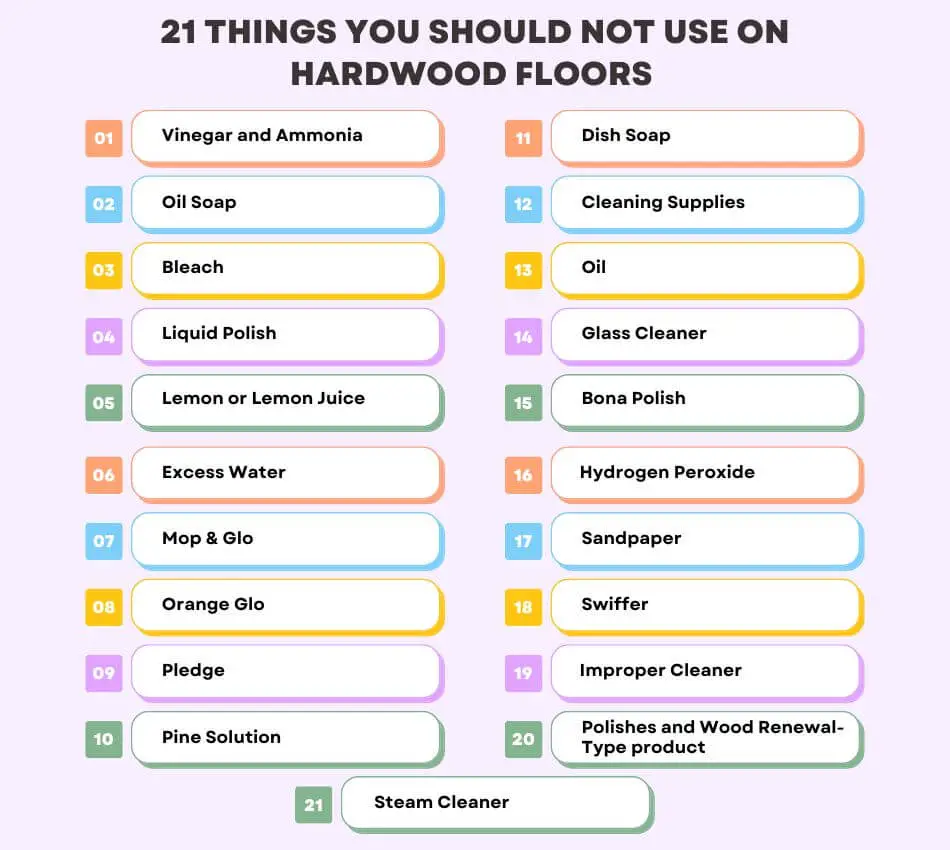
While using a mop and a bucket of water to clean your hardwood floors seems like a good idea, using too much water can cause the wood to absorb the liquid, expand, and even break at the seams.
A terrible mess is made which can be tough to clean up and may even require replacement. A dry mop and a few scented liquid oils ought to be plenty.
7. Mop & Glo
It leaves a film on the floor that needs to be constantly maintained, much like Bona Polish does. If you don’t do regular cleaning this film can trap dirt and grime and cause the floor to get even dirtier.
8. Orange Glo
Orange Glo has the same arguments against using Mop & Glo. It can also leave some residues that might cause the floor to get dirtier than it was before and hence, it should not be used on hardwood floors.
9. Pledge
This substance coats the floor with a film and makes it exceedingly slick. The film makes the hardwood floors sticky which can attract more dust from your shoes or the air.
Hence, nullifying the purpose of your cleaning attempts.
10. Pine Solution
Pine solution again creates a residual on the surface that might accumulate over time and become more difficult to eliminate.
Hence, you either need to stop using it or rinse it thoroughly a few times before you can use the hardwood floor again.
11. Dish Soap
Possibility of leaving a coating on the finish, Please be aware that these products may harm the floor and cause problems with the subsequent application of finish in addition to leaving a film on the hardwood floor that will become ugly after a few uses.
12. Cleaning supplies
Cleaning supplies found in food shops need to be good for the hardwood floor.
If they are used repeatedly, they will harm the finish. A wet mop and one of these items is a formula for catastrophe.
13. Oil
Let’s clarify the truth about oil and wood flooring right now. Our cleaning experts advise us that adding a little shine to wood floors is acceptable by using modest amounts of diluted oil.

But, an excess of oil can quickly become worse. That accomplishes what oil accomplishes: it makes floors dangerously slick! Additionally, later removal of that is difficult.
14. Glass Cleaner
For wood floors, glass cleaners are not recommended. Some are made with abrasive substances (like ammonia) that can scratch and stain your floors.
15. Bona Polish
This item is the leading cause of floor destruction we encounter. A cleaning for hardwood floors is not Bona Polish.
You apply this cheap, thin finish to your floors. The coating thickens with time and frequent use, but it also scuffs and scratches readily, leaving the floors ugly.
Removing the Bona Polish is the only way to recover your flooring.
Chemical engineers have created a unique stripper that will eliminate the Polish without hurting the finish layer underneath because this product is so widely used.
We have the skills and equipment necessary to complete this task. In addition, based on the state of the floor, we can easily apply a new coat of superior floor finish to restore your floors to their former glory.
16. Hydrogen Peroxide
There is no questioning the effectiveness of hydrogen peroxide as a cleaning agent for treating stubborn stains, mold, and microorganisms.
However, you can only use it on some surfaces, particularly finished wood. If you use it repeatedly, it may stain your glossy flooring.
To prevent stains, accumulated oil, and filth, you can run a moist microfiber mop over your floors regularly if you don’t want to damage them.
17. Sandpaper
People wish to save time on removing stubborn stains. Hence, people buy expensive cleaning equipment to get clean results quickly and may use sandpaper to get rid of dirt and stains.
Your wood floors may receive scratches as a result, though. Thus, you ought to avoid using sand on such surfaces.
To keep your wooden floors looking spotless, it is preferable to use a magic eraser to remove dirt and stains. The most seasoned end-of-lease cleaners produce fast results with magic accessories and other environmentally friendly materials.
18. Swiffer
Swiffer should not be used if the hardwood floor is not sealed or the sealant layer is worn off.
Swiffer is excellent for hardwood floors because of its adaptable utilization, simple upkeep, and damage-free scrubbing.
On hardwood floors, however, it is advised to use a moist Swiffer after first looking for a few relevant reasons.
Swiffer can damage wooden surfaces with incorrect liquid cleaners and flooring conditions. Avoid using a wet Swiffer if any of the following conditions exist:
- The hardwood floors have no protective sealants.
- You notice numerous cracks in the numerous layers of sealants
- The floors appear somewhat swollen and bumpy
- An unpleasant odor develops while cleaning
- The fibers of the Swiffer pad start to become loose and stringy.
19. Improper Cleaner
Your wood floors may become damaged if you use the improper cleaner. Customers eventually use items they buy from a home improvement or grocery store shelf.
Several of these products claim to be safe for wood, yet utilizing them may damage your hardwood flooring. Keep an eye out for the following things that can harm your wood flooring:
20. Polishes and Wood Renewal-Type product
Some of them are acrylic materials, which may leave a buildup or residue on your floors over time.
For a while, using them could keep them looking fresh and shining, but with time, use can dull and make floors dangerously slick.
It’s also easier to repair this damage by seeking the advice of a qualified hardwood flooring contractor. A complete floor refinishing may be the only option depending on the accumulation.
21. Steam Cleaner on the Hardwood Floor
For hardwood flooring, steam cleaners are not suitable. We know that wood and water do not mix in any way no matter how sincere the sales pitch on TV or how persuasive the paid actor is.
That’s particularly true when it’s extremely heated and injected between the edges of flooring planks!
Your floors will undoubtedly be clean and bright after using a steam cleaner. Still, the additional moisture can lead to problems that are just as bad as or even worse than wet mopping.
Not to mention that using steam mops on a floor will usually void the warranty provided by the flooring manufacturer.
Most wooden floor treatments used in manufacturing and on-site are not designed to withstand excessively sticky situations.
High heat can cause finishes to bubble, flake, peel, or become discolored. Use wooden floor cleaning fluid and a moist rag for stubborn spots or filth. Your tiled or vinyl floors should only receive steam cleaning!
Vacuum beater bars and brush rollers and vacuum beater bars can damage wood floors. Vacuums can swiftly remove pet hair, dirt, and other waste from your flooring, but they may also harm your floors:
- Hard plastic wheels on vacuums can damage or scratch floors.
- Beater bars can damage or dent floors.
- Brush rollers have the potential to mar, buff-burn, or scrape the finish.
For vacuuming wood flooring, use a vacuum with smooth (clean) rubber tires and disable the brushing or beater bar. Instead, use wand attachments with felt or soft brushes.
Are Wet Mopping Hardwood Floors Okay?
Wet mopping is never advised for hardwood floors. Whatever you’ve seen, read, or heard, the real experts aren’t out to sell you anything.
With a microfiber mop and cleanser appropriate for hardwood, maintain flooring easily.
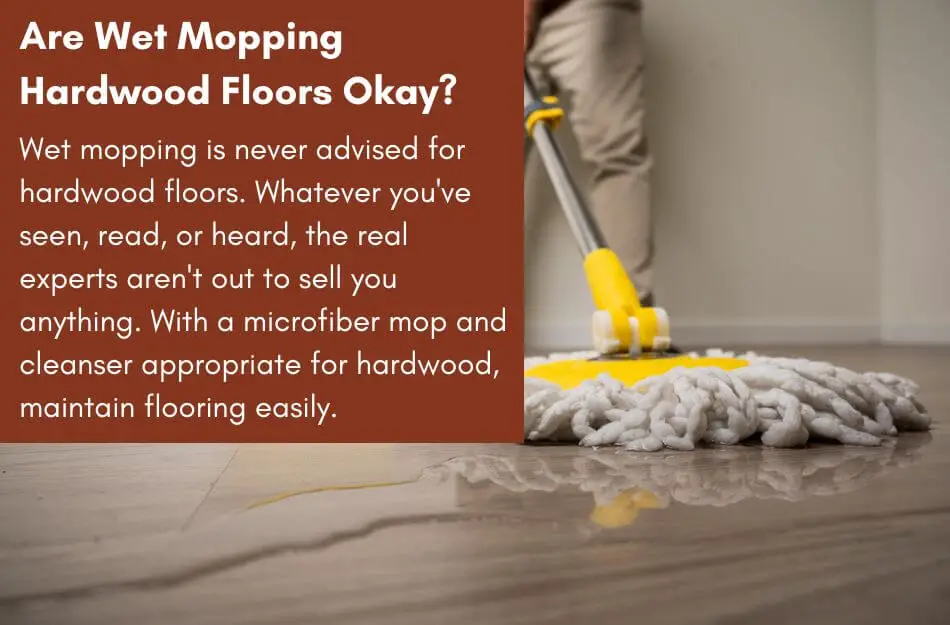
Although some individuals believe that swishing, a sopping wet mop across their floor is a good idea, doing so damages the wood and ruins the sheen.
While cleaning hardwood floors, a mop should only be marginally damp.
Does Hardwood Floor Swell if you Mop them with Water?
Hardwood floors; if not sealed, can swell up when they come into contact with water. Remember that wood and water do not mix, as a rule.
When exposed to water, wood flooring can function like a sponge and swell if given too much moisture. Wood floors must be kept in an atmosphere as consistent as possible in terms of humidity and temperature to remain stable.
Using too much water when mopping your floors might result in several serious issues, such as:
- Boards that cup or bulge
- Finish that is discolored and flaking
- Squeaking and popping noises
- Things to Stay Away from While Using Hardwood Floors
- These are the things you shouldn’t do to your floor are listed below.
- Don’t Wear Shoes
Wearing sneakers on your wood floor, especially ones with high heels is a surefire way to cause scratches and scuffs.
Moreover, the dampness and grime from your shoes might contaminate your flooring and result in additional harm.
Keep Your Dogs’ Nails Short
It is impossible to prevent your cat or dog from ever stepping on your hardwood floor. Therefore, it is a great idea to clip their nails so that their feet cause as little harm to your ground as possible.
You’ll be grateful to your ground (and your dogs) for it! Here’s a full guide on removing dog scratches from hardwood floors.
Avoid Burning It
Never place anything on your flooring that might ignite the wood. Items like a candle, a curler, a hot plate, or an old area heater could spark a fire and leave burn marks on wood floor.
Always keep heat-generating objects away from your wood floors.
Use Furniture Pads
Irrespective of the flooring, you will need to decorate your rooms, but be sure to get some little pads for the bottoms of your tables and chair legs.
Shifting your furniture about, or even just unintentionally bumping them occasionally, can result in significant scuffing and even gouging.
Stay within Projects Requiring Refinishing
Refinishing and sanding are substantially more expensive than re-coating.
Hardwood floors should be refinished every 4-6 years, depending on the amount of traffic and wear. Waiting until the finish has worn down to the bare wood may necessitate sanding.
Do Not Disregard Spills
Anybody who has children understands that mishaps are a regular occurrence.
The deadliest enemies of your wood floor are sippy cups that leak or cereal dishes that fly through the air. If a spill occurs (that’s okay, they happen in life), clean it up immediately.
Avoid Using Wheels
Your wood floor might quickly become scratched by the harsh plastic tires on the bottom of your house office chair or moving storage bench.
Put a rug or rubber mat beneath your wheeled furniture before dragging or pushing it around if you cannot fix the wheels with furnishings, feet, and pads.
Final Thoughts
The hardwood floors are easier to keep spotless and shining than you would assume. All you require is knowledge of what to use, what to avoid, and the proper cleaning supplies.
It would help to clean up spills immediately to avoid dulling or discoloring the surface. Use protective pads on every piece of furniture.
Avoid dragging any pieces over the floor since this could result in significant harm. Use carpets in entranceways and other high-traffic areas.
At the same time, think about polishing your floors every three or five years to keep them lovely, and protected.

As a co-creator of FlooringFlow.com, Emma Sophia comes on board to answer all your questions related to any flooring problems. Together with John Henry, she’s gained extensive experience in fixing many flooring problems in their own house as well as in friends and family’s. Now, she wants to share her knowledge that she gained during floor remodeling, restoring, and DIY projects.

